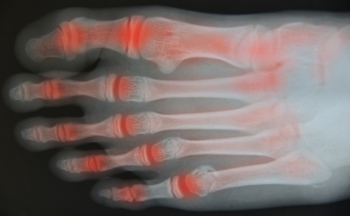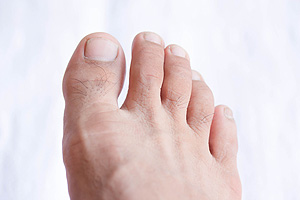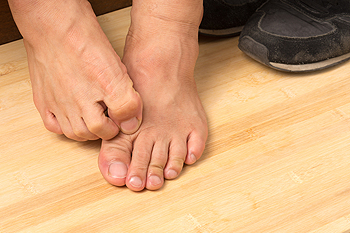NJ (908) 688-5577
NY (212) 737-2528
 The Achilles tendon is the band of tissues that connects the back of the calf muscles to the heel bone. Common causes of pain primarily consist of ruptures and tendonitis. During a tear or rupture of the Achilles tendon, some of the fibers may remain connected (partial tear) or tear completely. Ruptures are likely to occur when there is a sudden increase in exercise and may be signaled by a popping or snapping sound, pain in the back of the legs, or swelling around the heel. Achilles tendonitis occurs when the tendon becomes inflamed, resulting in pain, stiffness, or swelling. Achilles tendonitis can occur from excessive strain, tight calf muscles, or not warming up before exercising. If you are experiencing pain in your Achilles tendon it is recommended to have it checked by a podiatrist for a proper diagnosis.
The Achilles tendon is the band of tissues that connects the back of the calf muscles to the heel bone. Common causes of pain primarily consist of ruptures and tendonitis. During a tear or rupture of the Achilles tendon, some of the fibers may remain connected (partial tear) or tear completely. Ruptures are likely to occur when there is a sudden increase in exercise and may be signaled by a popping or snapping sound, pain in the back of the legs, or swelling around the heel. Achilles tendonitis occurs when the tendon becomes inflamed, resulting in pain, stiffness, or swelling. Achilles tendonitis can occur from excessive strain, tight calf muscles, or not warming up before exercising. If you are experiencing pain in your Achilles tendon it is recommended to have it checked by a podiatrist for a proper diagnosis.
Achilles tendon injuries need immediate attention to avoid future complications. If you have any concerns, contact Glenn Davison, DPM of Advanced Podiatry. Our doctor can provide the care you need to keep you pain-free and on your feet.
What Is the Achilles Tendon?
The Achilles tendon is a tendon that connects the lower leg muscles and calf to the heel of the foot. It is the strongest tendon in the human body and is essential for making movement possible. Because this tendon is such an integral part of the body, any injuries to it can create immense difficulties and should immediately be presented to a doctor.
What Are the Symptoms of an Achilles Tendon Injury?
There are various types of injuries that can affect the Achilles tendon. The two most common injuries are Achilles tendinitis and ruptures of the tendon.
Achilles Tendinitis Symptoms
Rupture Symptoms
Treatment and Prevention
Achilles tendon injuries are diagnosed by a thorough physical evaluation, which can include an MRI. Treatment involves rest, physical therapy, and in some cases, surgery. However, various preventative measures can be taken to avoid these injuries, such as:
If you have any questions please feel free to contact our offices located in Union, NJ and New York . We offer the newest diagnostic tools and technology to treat your foot and ankle needs.
 Osteoarthritis is a condition that causes the breakdown and loss of cartilage in the joints. The joints of the feet and ankles are often affected. Symptoms of osteoarthritis include pain, stiffness, and swelling in the affected joints, difficulty walking, and difficulty bending the joints. There are several nonsurgical treatments for osteoarthritis in the feet. Nonsteroidal anti-inflammatory drugs can reduce pain and inflammation, as can steroid injections into the affected joint. Orthotic devices can cushion the foot while walking or standing. Bracing or immobilizing the foot protects the foot from movement and can reduce pain. Physical therapy may also help, especially when osteoarthritis occurs in the ankle. To find out which treatments are best for you, consult a podiatrist.
Osteoarthritis is a condition that causes the breakdown and loss of cartilage in the joints. The joints of the feet and ankles are often affected. Symptoms of osteoarthritis include pain, stiffness, and swelling in the affected joints, difficulty walking, and difficulty bending the joints. There are several nonsurgical treatments for osteoarthritis in the feet. Nonsteroidal anti-inflammatory drugs can reduce pain and inflammation, as can steroid injections into the affected joint. Orthotic devices can cushion the foot while walking or standing. Bracing or immobilizing the foot protects the foot from movement and can reduce pain. Physical therapy may also help, especially when osteoarthritis occurs in the ankle. To find out which treatments are best for you, consult a podiatrist.
Arthritis can be a difficult condition to live with. If you are seeking treatment, contact Glenn Davison, DPM from Advanced Podiatry. Our doctor can provide the care you need to keep you pain-free and on your feet.
Arthritic Foot Care
Arthritis is a joint disorder that involves the inflammation of different joints in your body, such as those in your feet. Arthritis is often caused by a degenerative joint disease and causes mild to severe pain in all affected areas. In addition to this, swelling and stiffness in the affected joints can also be a common symptom of arthritis.
In many cases, wearing ill-fitting shoes can worsen the effects and pain of arthritis. Wearing shoes that have a lower heel and extra room can help your feet feel more comfortable. In cases of rheumatoid arthritis, the arch in your foot may become problematic. Buying shoes with proper arch support that contour to your feet can help immensely.
Alleviating Arthritic Pain
It is best to see your doctor for the treatment that is right for your needs and symptoms. Conditions vary, and a podiatrist can help you determine the right method of care for your feet.
If you have any questions, please feel free to contact our offices located in Union, NJ and New York . We offer the newest diagnostic tools and technology to treat your foot and ankle needs.
 Pain while walking, tenderness, swelling, bruising, discoloration, misalignment or bumps on your toe are all common characteristics of big toe pain. Often, injuries such as stubbing your toe, overuse during exercise, and wearing ill-fitting shoes can be the source to blame. Other conditions that might cause toe pain include gout, rheumatoid arthritis, bunions, Morton’s neuroma, a toenail infection, and a fracture. Some at home remedies for toe pain can include soaking the toe, rest ice and elevation, as well as proper fitting footwear. If pain becomes severe or signs of an infection are developing, it is suggested to seek medical attention. A podiatrist can diagnose your underlying condition and provide you with the best treatment options.
Pain while walking, tenderness, swelling, bruising, discoloration, misalignment or bumps on your toe are all common characteristics of big toe pain. Often, injuries such as stubbing your toe, overuse during exercise, and wearing ill-fitting shoes can be the source to blame. Other conditions that might cause toe pain include gout, rheumatoid arthritis, bunions, Morton’s neuroma, a toenail infection, and a fracture. Some at home remedies for toe pain can include soaking the toe, rest ice and elevation, as well as proper fitting footwear. If pain becomes severe or signs of an infection are developing, it is suggested to seek medical attention. A podiatrist can diagnose your underlying condition and provide you with the best treatment options.
Foot Pain
Foot pain can be extremely painful and debilitating. If you have a foot pain, consult with Glenn Davison, DPM from Advanced Podiatry. Our doctor will assess your condition and provide you with quality foot and ankle treatment.
Causes
Foot pain is a very broad condition that could be caused by one or more ailments. The most common include:
Diagnosis
To figure out the cause of foot pain, podiatrists utilize several different methods. This can range from simple visual inspections and sensation tests to X-rays and MRI scans. Prior medical history, family medical history, and any recent physical traumatic events will all be taken into consideration for a proper diagnosis.
Treatment
Treatment depends upon the cause of the foot pain. Whether it is resting, staying off the foot, or having surgery; podiatrists have a number of treatment options available for foot pain.
If you have any questions, please feel free to contact our offices located in Union, NJ and New York . We offer the newest diagnostic and treatment technologies for all your foot care needs.
 Dry, cracked skin between your toes can be caused by athlete’s foot, a fungal infection of the skin, also known as tinea pedis. Athlete’s foot is an extremely common condition, affecting millions of people each year. When you have athlete’s foot, the skin between your toes may become itchy, flaky, thickened, white, or swollen. This condition can also cause skin redness and pain in your feet. The most common treatment for athlete’s foot is a topical antifungal medication that kills or prevents the growth of the fungus. If you suspect that you have athlete’s foot, it is recommended that you see a podiatrist for a diagnosis and treatment.
Dry, cracked skin between your toes can be caused by athlete’s foot, a fungal infection of the skin, also known as tinea pedis. Athlete’s foot is an extremely common condition, affecting millions of people each year. When you have athlete’s foot, the skin between your toes may become itchy, flaky, thickened, white, or swollen. This condition can also cause skin redness and pain in your feet. The most common treatment for athlete’s foot is a topical antifungal medication that kills or prevents the growth of the fungus. If you suspect that you have athlete’s foot, it is recommended that you see a podiatrist for a diagnosis and treatment.
Athlete’s foot is an inconvenient condition that can be easily reduced with the proper treatment. If you have any concerns about your feet and ankles, contact Glenn Davison, DPM from Advanced Podiatry. Our doctor will treat your foot and ankle needs.
Athlete’s Foot: The Sole Story
Athlete's foot, also known as tinea pedis, can be an extremely contagious foot infection. It is commonly contracted in public changing areas and bathrooms, dormitory style living quarters, around locker rooms and public swimming pools, or anywhere your feet often come into contact with other people.
Solutions to Combat Athlete’s Foot
Athlete’s foot can cause many irritating symptoms such as dry and flaking skin, itching, and redness. Some more severe symptoms can include bleeding and cracked skin, intense itching and burning, and even pain when walking. In the worst cases, Athlete’s foot can cause blistering as well. Speak to your podiatrist for a better understanding of the different causes of Athlete’s foot, as well as help in determining which treatment options are best for you.
If you have any questions please feel free to contact our offices located in Union, NJ and New York . We offer the newest diagnostic and treatment technologies for all your foot and ankle needs.